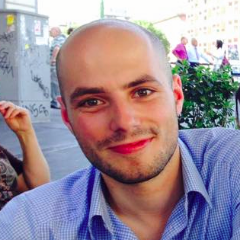Can an opera really help prevent further climate change? Or perhaps that is the wrong question. Fictional climate change scientist David Adamson, tonight's protagonist, puts it more pertinently: "if this is not my planet, then whose is it?" Few of us would dispute that our planet is in danger, an inescapable reality that affects us all. An opera bold enough to challenge us to engage with this reality is surely deserving of merit.
Regardless, tonight's work commands merit on the quality of its music and drama alone. CO₂ is Giorgio Battistelli's new work for La Scala, commissioned in 2007, scheduled for 2011, rescheduled for 2013 and now coincidently, and happily, coinciding with Milan's Expo, whose theme is "Feeding the planet, energy for life". Eventually settling on Robert Carsen as the director, Battistelli's librettist is British dramaturg Ian Burton, whose text draws on sources as varied as the Vedic scriptures and Al Gore's An Inconvenient Truth in a textual collage grounded in English but also featuring eight other languages (Latin, Ancient Greek and Sanskrit feature heavily for mystical contributions from the chorus). Baritone Anthony Michaels-Moore delivered Adamson's jumping lines and Sprechgesang with real poise. His lecture on climate change is punctuated with nine assorted scenes on varied themes that take us from The Creation in Genesis to the Kyoto Conference. A dizzying meditation on Man's destruction of its planet.
Carsen's staging consists of a central scrim framed by an electronic message board where facts and figures flash up to overwhelm us with the sheer density of information. Scenes depicting the uglier aspects of humanity materialise behind like hallucinations, so that awaiting passengers whip into a delirium when a departures board in the airport of Scene 2 shows that all flights are cancelled, the stage blacking out and the electronic frame blinking red. A vision of greed gone mad dawns in the supermarket of Scene 6: housewives victoriously paraded in trollies, singing homage to "Granny Smith! Cox's Pippin! All from England!" to background images of apples that roll and roll. We had written off Kyoto as a failure back in Scene 3 when UN delegates bellowed in a percussive babel that descended into a brawl.
Percussion predominates in Battistelli's music. Nowhere are the rhythms more driving than when spinning dancers represent the harrowingly manifold hurricanes of 2013 and 2014 in the Whirling Dervish of Scene 4. Elsewhere the score flexes and spangles as it shifts to fit dramatic requirements. The Garden of Eden bubbles in lush colours - slippery brass and dreamy harp - and countertenor David DQ Lee's serpent had an Oberon-like mystique, jumping seductively, sibilantly in and out of his chest register. The music acquires a breathtaking lucidity in Scene 7 for Mrs. Mason and Mr. Changtalay's mourning of tsunami victims. They stare into unruffled waters to a score that moves in tranquil surges.
Our heads were sent spinning through the sheer disconnected breadth and volume of the drama's material, but Gaia's descent from the gods focussed our perception to a pinpoint precision. Here, she is simultaneously the Greek personification of Earth and an exponent of physicist James Lovelock's Gaia hypothesis - that our planet supports life only because it works as a self-regulating organism (in a complex process that we are in the process of unbalancing). "They have burnt my forests, flooded my plains," shrieked Jennifer Johnston in what was the most striking performance of the evening, "But they will not destroy me, they will destroy themselves!" This was followed by Edward Burtynsky's apocalyptic images of landscapes devastated by industry, and we witness scientific research and political discussion eclipsed by the seemingly stark reality that, unless it changes its behaviour, humankind is doomed.
Ian Burton's libretto is immensely effective, and it concludes in penetrating, thought-provoking style. Adamson muses on a period in isolation, alone in a cabin like Thoreau at Walden Pond, recounting his communion with nature with apostolic rapture. "If I am not the cause" he concludes, "then am I not also the cure?" The auditorium's lights flared up, drawing a blinking audience back into the room. The fourth wall was well and truly broken, and each of us was given no option but to acknowledge our responsibility for the planet.




